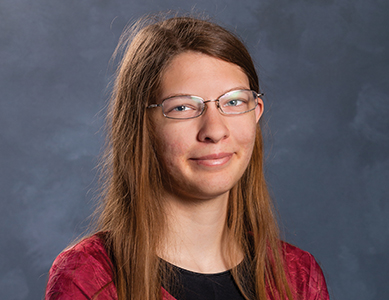Laura Wacaser
Former E2E Scholarship Recipient, Successful Transfer Student and Intern

Growing up, Laura Wacaser was always intrigued by science.
The farther she got into her education, she realized she also enjoyed the concept of improving and optimizing designs and processes—and using those talents to make an impact. So, in 2020, Wacaser started at MCC to earn her Associate in Engineering Science with plans to transfer to earn her bachelor’s degree.
Her achievements, both at MCC and in her early education, earned her an Education to Empowerment (E2E) scholarship in 2021. The scholarship provides mentorship opportunities and $10,000 in funding for each student that can be applied toward tuition, books, and fees for a recipient’s last year at MCC and first year at an accredited four-year institution.
“E2E not only financially enabled me to transfer to a highly esteemed university for the remainder of my degree, but I also made a lot of valuable connections through the program,” Wacaser said. “My mentor has given me excellent advice, and the E2E events gave me a great introduction to the importance of networking.”
In Fall 2022, Wacaser transferred to the Rose-Hulman Institute of Technology in Indiana to study chemical engineering.
“When I got there, I had already completed a huge chunk of my required classes: math, physics, chemistry, and humanities/social sciences/arts,” she said. “Rose-Hulman classes are accelerated, and I found there were several topics I had learned at MCC that others in the class never covered, especially in calculus, physics, and organic chemistry. I had a really good foundation in these topics and had no trouble merging into the curriculum.”
Earlier this year, Wacaser began an internship in the crop protection division of Corteva Agriscience, an agricultural chemical and seed company.
“The main purpose of the plant I'm in is to produce small batches of new molecules,” she said. “It's a mix of research/development and production experience. The molecules don't even have names yet when we start them, and the engineers/chemists are figuring out how to manufacture them at this scale for the first time. It’s really exciting.”
Stepping into a chemical plant and applying terms she’s been learning in class has also been a valuable learning experience for Wacaser.
“Teachers and textbooks toss around terms like ‘heat exchanger’ and ‘centrifugal pump,’ but it’s completely different to go out in the field and see how they are used,” she said.
Wacaser is also learning about the types of problem-solving that engineers are called to do.
“The questions you get asked as a plant engineer are related to what you learn in class, but the questions themselves are completely different from the problems in your homework,” she said. “Most homework questions give you a set of known variables and ask you to solve for an unknown value. In the plant, engineers get asked, ‘Why is this equipment not working?’ more often.”
One of her biggest projects in the internship has been updating the plant’s collection of technical drawings. Another project is a cleanout campaign, where she is helping to plan for a months-long major cleanout of equipment in preparation for it being used to create different molecules. She is also responsible for running daily plant meetings.
“I love how there is always something to learn,” Laura said of her internship. “I love how technical and scientific principles are used on such a huge scale, and that the technology is used to actually make something.”
The internship is a six-month commitment, so Wacaser is taking the fall term off to complete the opportunity. She will be back at Rose-Hulman in November and plans to graduate in 2025 with her bachelor’s in chemical engineering.
“Because some classes are only offered certain parts of the year, I’ll end up being at Rose-Hulman for three years,” she said. “But because I came in with so many credits from MCC, I was able to take an entire quarter off to do this internship. And I have space for so many extra electives that I will be able to earn two minors in materials science/engineering and Spanish.”
While graduation still feels far away, Wacaser says she would eventually like to pursue work as a unit engineer who works with a specific plant and has a deep understanding of all the equipment and chemistry in their process.
MCC not only helped to set the foundation for Laura’s continuing education—it was a large part of her family’s story, too.
Wacaser is one of eight children, and one of seven in her family to have attended MCC.
“Two of my siblings started and finished MCC at the same time I did, so we were able to be in a lot of the same classes,” she said. “Four of us in total transferred our classes to four-year universities; three graduated with an associate degree.”
When asked about her advice for MCC students, Laura said, “Try your hardest and learn everything you can while you are in school, because once you get out in the world, you have to figure things out on your own. Even now, as a student, you can practice by talking to your professors and asking questions about the material.”
She also encouraged transfer students to get involved on their new campuses.
“It can be tough to break into friend groups that started without you, but it is completely worth it. Join a club, play intermural sports, or get adopted by a dorm if you don’t live on campus.”
Learn about earning an Associate in Engineering Science at MCC
